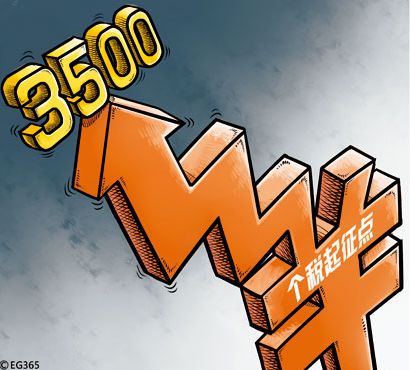Will a higher tax threshold fuel growth?
- By Tylor Claggett
 0 Comment(s)
0 Comment(s) Print
Print E-mail
China.org.cn, July 18, 2011
E-mail
China.org.cn, July 18, 2011
 |
|
[CFP Photo] |
Recently, the Standing Committee of the National People's Congress raised the minimum personal taxable income threshold to 3,500 yuan per month. The move comes in response to public calls to reduce the tax burden for low-income families amid rising consumer prices. I am sure the new policy will be popular with average Chinese taxpayers. However, from an aggregate point of view, one must ask what the consequences will be.
With a deep-rooted tradition of saving, China has one of the highest savings rates in the world. So, it is reasonable to assume some of the personal tax reductions will be diverted into personal savings accounts even though consumer prices are rising. It would be better for the Chinese economy if Chinese consumers would spend their extra money on products (and services) produced in China. This would serve to slowly change China's export-driven economy into one that is more balanced with respect to domestic consumption.
Another set of questions involves what the government will do when as faces a decline in revenue: will diminished social welfare benefits be reduced even more, or will the government dip into reserves to maintain the current safety net? From what I have been told, many Chinese have developed high savings habits precisely because of diminished government spending on health care and higher education. Any cuts in government services may further increase personal savings rates, which in turn could lead to slower economic growth.
Should Chinese citizens expect further increases in the minimum income threshold? If Chinese consumers react positively by spending more money on daily consumption and thereby stimulating the economy, policymakers may be more inclined to raise the threshold again in the future. Such tax cuts would be a Chinese version of the Reagan era supply side economic policies that served the US economy well in the late 1980s and 1990s.
A 3,500 yuan-threshold seems relatively small to make a real difference in people's consumption habits (and government revenues for that matter). However, the policy may have a larger economic and political impact in China's rural areas, where incomes are much lower than in the cities. Hopefully the tax break will do some good for those people who have so far been less able to enjoy the benefits of China's economic miracle.
The author is a columnist with China.org.cn. For more information please visit: http://www.ccgp-fushun.com/opinion/node_7078635.htm
Opinion articles reflect the views of their authors, not necessarily those of China.org.cn.





